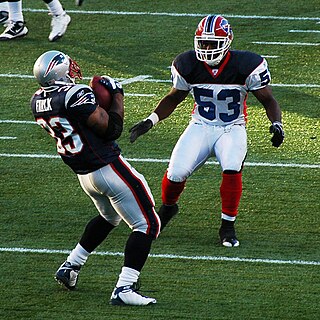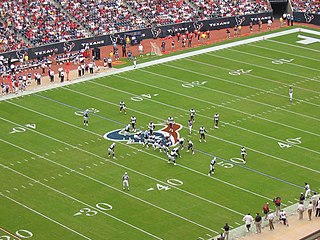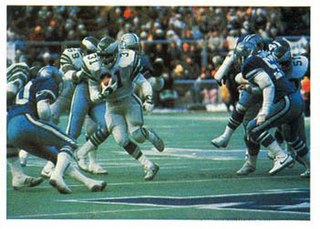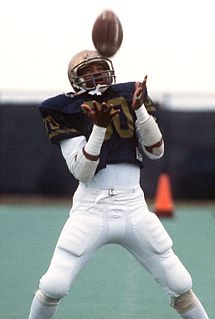
Canadian football is a sport played in Canada in which two teams of 12 players each compete for territorial control of a field of play 110 yards (101 m) long and 65 yards (59 m) wide attempting to advance a pointed oval-shaped ball into the opposing team's scoring area.

Super Bowl XX was an American football game between the National Football Conference (NFC) champion Chicago Bears and the American Football Conference (AFC) champion New England Patriots to decide the National Football League (NFL) champion for the 1985 season. The Bears defeated the Patriots by the score of 46–10, capturing their first NFL championship since 1963, three years prior to the birth of the Super Bowl. Super Bowl XX was played on January 26, 1986, at the Louisiana Superdome in New Orleans.

A running back (RB) is an American and Canadian football position, a member of the offensive backfield. The primary roles of a running back are to receive handoffs from the quarterback for a rushing play, to catch passes from out of the backfield, and to block. There are usually one or two running backs on the field for a given play, depending on the offensive formation. A running back may be a halfback, a wingback or a fullback. A running back will sometimes be called a "feature back" if he is the team's starting running back.

Rushing is an action taken by the offense that means to advance the ball by running with it, as opposed to passing, or kicking.

A fair catch is a feature of American football and several other codes of football, in which a player attempting to catch a ball kicked by the opposing team – either on a kickoff or punt – is entitled to catch the ball without interference from any member of the kicking team. A ball caught in this manner becomes dead once caught, i.e., the player catching the ball is not entitled to run with the ball in an attempt to gain yardage, and the receiving team begins its drive at the spot where the ball was caught. A player wishing to make a fair catch signals his intent by extending one arm above his head and waving it while the kicked ball is in flight. The kicking team must allow the player an opportunity to make the catch without interference.

American and Canadian football are gridiron codes of football that are very similar. Both have their origins in rugby football. There are, however, some key differences.
Strategy forms a major part of the game of American football, and both teams plan many aspects of their plays (offense) and response to plays (defense), such as what formations they take, who they put on the field, and the roles and instructions each player are given. Throughout a game, each team adapts to the other's apparent strengths and weaknesses, trying various approaches to outmaneuver or overpower their opponent to score more points in order to win the game.

Game play in American football consists of a series of downs, individual plays of short duration, outside of which the ball is dead or not in play. These can be plays from scrimmage – passes, runs, punts, or field goal attempts – or free kicks such as kickoffs and fair catch kicks. Substitutions can be made between downs, which allows for a great deal of specialization as coaches choose the players best suited for each particular situation. During a play, each team should have no more than 11 players on the field, and each of them has specific tasks assigned for that specific play.
The National Football League playoffs for the 1995 season began on December 30, 1995. The postseason tournament concluded with the Dallas Cowboys defeating the Pittsburgh Steelers in Super Bowl XXX, 27–17, on January 28, 1996, at Sun Devil Stadium in Tempe, Arizona.

The National Football League playoffs for the 1980 season began on December 28, 1980. The postseason tournament concluded with the Oakland Raiders defeating the Philadelphia Eagles in Super Bowl XV, 27–10, on January 25, 1981, at the Louisiana Superdome in New Orleans, Louisiana.

The National Football League playoffs for the 1981 season began on December 27, 1981. The postseason tournament concluded with the San Francisco 49ers defeating the Cincinnati Bengals in Super Bowl XVI, 26–21, on January 24, 1982, at the Pontiac Silverdome in Pontiac, Michigan.

In American football and Canadian football, a reception, also known informally as a catch, is part of a play in which a forward pass from behind the line of scrimmage is received (caught) by a player in bounds, who, after the catch, proceeds to either score a touchdown or be downed. Yards gained from the receiving play are credited to the receiver as receiving yards. If such a pass is not caught by the receiver, it is called an incomplete pass or simply an incompletion.

Anthony Carter is a former American football wide receiver. He finished his college career as the University of Michigan's all-time leading receiver, and played professionally for thirteen years in the United States Football League and the National Football League. He is also known as 'AC'.
Total offense is an American football and Canadian football statistic representing the total number of yards rushing and yards passing by a team or player. Total offense differs from yards from scrimmage, which gives credit for passing yardage to the person receiving the football rather than the person throwing the football.
The following terms are used in American football, both conventional and indoor. Some of these terms are also in use in Canadian football; for a list of terms unique to that code, see Glossary of Canadian football.
In American football and Canadian football, a turnover on downs occurs when a team's offense has used all their downs but has not progressed downfield enough to earn another set of downs. The resulting turnover gives possession of the ball to the team on defense.

In American and Canadian football, a punt is a kick performed by dropping the ball from the hands and then kicking the ball before it hits the ground. The most common use of this tactic is to punt the ball downfield to the opposing team, usually on the final down, with the hope of giving the receiving team a field position that is more advantageous to the kicking team when possession changes. The result of a typical punt, barring any penalties or extraordinary circumstances, is a first down for the receiving team. A punt is not to be confused with a drop kick, a kick after the ball hits the ground, now rare in both American and Canadian football.
The National Football League playoffs for the 2013 season began on January 4, 2014. The postseason tournament concluded with the Seattle Seahawks defeating the Denver Broncos in Super Bowl XLVIII, 43–8, on February 2, at MetLife Stadium in East Rutherford, New Jersey.
The 2017–18 NFL playoffs began on January 6, 2018, after the 2017 season, and concluded with Super Bowl LII on Sunday, February 4, 2018, when the Philadelphia Eagles defeated the New England Patriots at U.S. Bank Stadium in Minneapolis, Minnesota.













